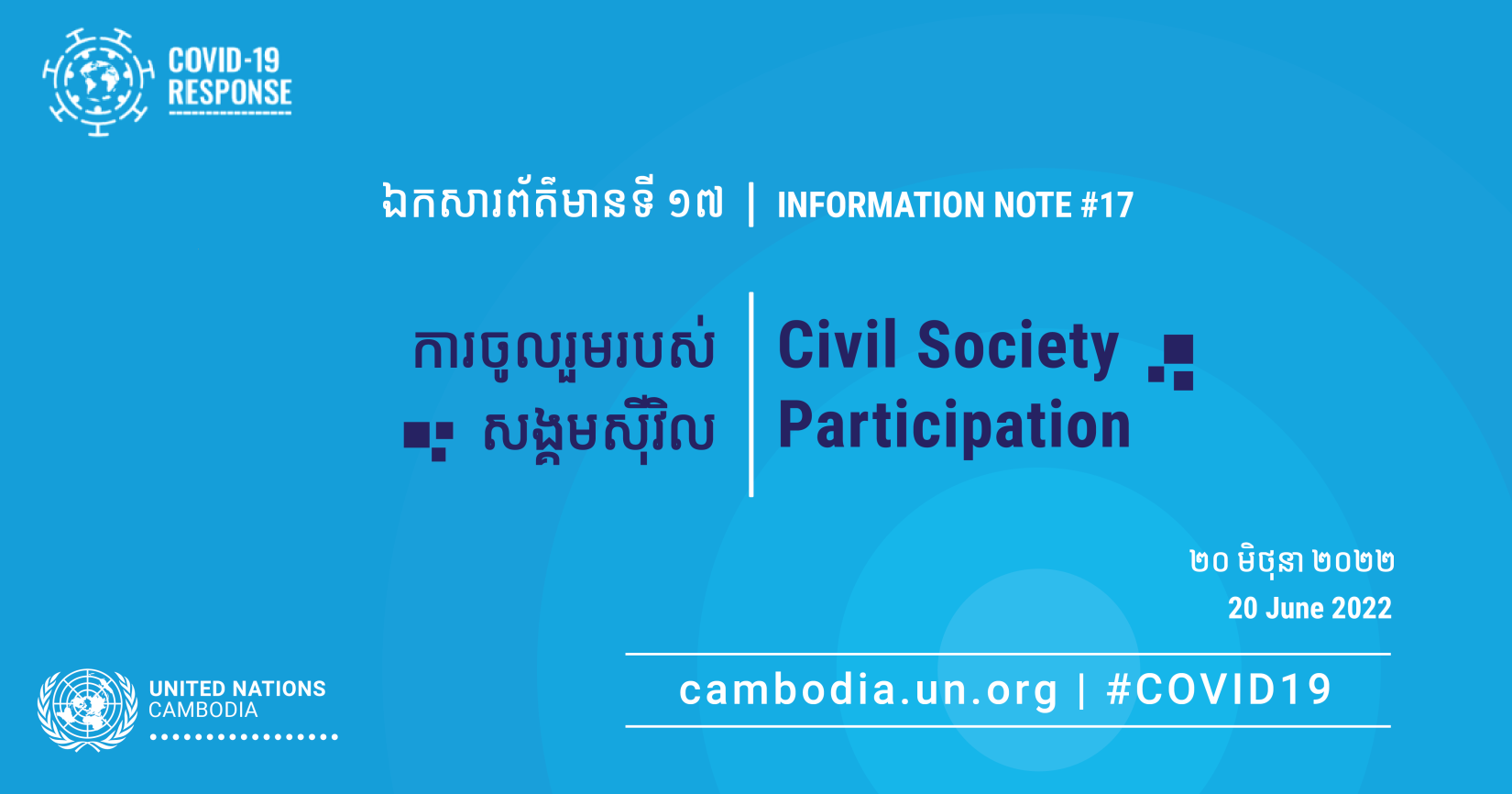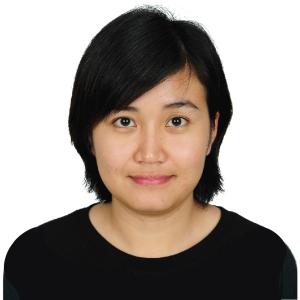Information Note #17: Civil Society Participation
20 June 2022

The United Nations Secretary-General’s Call to Action for Human Rights includes public participation and civic space as one of seven thematic areas for action, stating that “society is stronger and more resilient when women and men can play a meaningful role in political, economic and social life, contributing to policy-making that affects their lives, including by accessing information, engaging in dialogue, expressing dissent and joining together to express their views.”
Civic space is key for achieving the Sustainable Development Goals. It is the marginalized people who are at the greatest risk of being left behind. By ensuring the meaningful participation of civil society, countries can reduce inequality, ensure inclusion, and improve sustainability. In Cambodia, civil society actors cover a wide range of issues, including service delivery in the development and humanitarian fields, promoting good governance, conservation, peace-building, and human rights. They are found in every province of the country, in every sector, and staffed by individuals and volunteers from a wide range of backgrounds.
Cambodia’s Constitution, promulgated in 1993, places an emphasis on the role of the individual in public life, enshrining in Article 35, the right “to participate actively in the political, economic, social and cultural life of the nation”. However, the constitutional promise that “suggestions from the people shall be given full consideration” by the authorities are still to be fully implemented. Since 2017, civic space and exercise of fundamental freedoms has been restricted as outlined in successive reports by the United Nations.[1]
United Nations Support
Since the 1990s, the United Nations has worked hand-in-hand with civil society in Cambodia to promote and protect human rights. It has provided training and capacity building to civil society actors on international human rights standards, worked with civil society partners in investigating allegations of human rights violations and abuses, promoted their participation in public affairs, and supported their advocacy at national and international level.
Today, the United Nations in Cambodia continues to empower civil society as human rights defender and accelerator for development, advocating for the expansion and protection of its operating space. The United Nation’s partnership with civil society has allowed it to play a critical role as defender of rights since its inception.
The right to freedom of expression: Working closely with the Royal Government of Cambodia, journalists and civil society the United Nations is providing technical assistance, capacity-building and legal support, as well as strengthening networks to promote greater freedom of expression, access to information and media freedom as fundamental human rights and critical pillars of democracy. As part of the implementation of the UN Plan of Action on the Safety of Journalists, a legal support desk has been set up with lawyers with expertise on freedom of expression, providing support and advice on Cambodia’s legislation to over 30 media professionals. Furthermore, following the Plan of Action, more than 300 representatives from the media, the Ministry of Interior, Ministry of Information and Ministry of Justice have engaged in a series of dialogues convened by the United Nations to build better understanding of the role of the media in providing information to the public during the pandemic, and foster collaboration between the authorities and journalists to create an enabling environment for freedom of expression and access to information.
The right to freedom of association: The United Nations continues to work closely with civil society organizations, including human rights groups, trade unions and others, to build their knowledge and capacities, understand the threats they are facing and to monitor developments with regard to their operating environment. The United Nations has worked closely with civil society to advocate against the shrinking of civic space, including by identifying problematic provisions of legislation that regulates NGOs, associations, and trade unions, and the work that they carry out. In February this year, the UN in Cambodia launched a project aimed at bolstering civic space.
The right to freedom of peaceful assembly: The United Nations monitors the exercise of this right, including by monitoring demonstrations and engaging with authorities to ensure that this right is upheld. For many years, the UN has been present at demonstrations in Phnom Penh and elsewhere in the country, assisting authorities in ensuring that they facilitate rather than restrict or hamper the right to protest. This has included liaising with authorities in moments of high tension.
The right to participation in public affairs: The United Nations develops the capacity of civil society organizations and creates the space for their participation in policy-making and localizing the SDGs for more informed, effective, sustainable and inclusive decisions, for example, children and youth, women, and indigenous peoples. Each advance in protecting civic space has a positive ripple effect for communities and individuals, and their rights. It is also critical for development, peace, and security more broadly. In the area of youth, the United Nations Youth Advisory Panel (UNYAP) in Cambodia was established in 2007 as an interactive platform for dialogue with young people led by young people, to understand their development priorities and perspectives and ensure the voices of Cambodian young people are heard within the UN system. In 2021, UNYAP with support from UN and partners, was able to successfully mobilize young people through the organization of major events such as International Youth Day, Youth Talk Programmes, Campaign on Promoting Decent Employability for Youth and a media mentoring programme to build capacity on civic engagement.
In its Universal Periodic Review (UPR) in 2019, the Royal Government voluntarily committed to “ensure a free civic space, allowing human rights defenders and journalists to freely express themselves both offline and online, without fear of harassment or reprisal, and refrain from prosecuting persons for exercising their fundamental rights”. In September 2021, the UN Secretary-General called on Cambodia to “strengthen civic and democratic space, [and] end harassment of political actors and human rights defenders”. The United Nations has worked with the relevant ministries and institutions, including the Cambodia Human Rights Committee, to implement the UPR recommendations and increase dialogue with the civil society. For instance, a consultation of the UPR Mid-term Report was co-organized on 23 March 2022.
As Cambodia recently held the Commune Council elections and moves towards national elections in 2023, citizens and civil society organizations, including women’s organizations, need to be able to fully contribute and participate in policy making that affect their lives. The Secretary-General’s Call to Action for Human Rights reiterates that the active engagement of civil society actors is critical to achieving the Sustainable Development Goals in Cambodia. Despite not having a mandate to get involved in assisting, organizing, or observing the 2022 commune elections, the United Nations closely monitored the human rights situation in during the electoral period[2]. The United Nations stands ready to support the Royal Government of Cambodia in taking steps to improve civic space through legislative reform to strengthen compliance with Cambodia’s international human rights obligations, including the Law on Associations and Non-Governmental Organizations and the Law on Trade Unions.
The 2030 Agenda for Sustainable Development places human rights at the heart of efforts to promote and drive socioeconomic development with its key principle of leaving no-one behind and empowering people as active agents of sustainable development. The United Nations, as a development partner of Cambodia, will continue to highlight the interdependence of all human rights and to collaborate with the Government to improve civic space and to ensure that Cambodia’s development is shared, inclusive and harnesses the skills and contributions of the society as a whole and the country’s civil society.
###
UN Cambodia’s Response to COVID-19 Information Notes are official documents from the United Nations in Cambodia intended for the media and other partners. They are consolidated by the Office of the UN Resident Coordinator on behalf of the UN Country Team.
[1] See, for example, Report of the UN Secretary-General to the Human Rights Council, 16 September 2021.
[2] https://cambodia.un.org/en/183273-united-nations-not-involved-assisting-organizing-or-observing-2022-commune-elections


